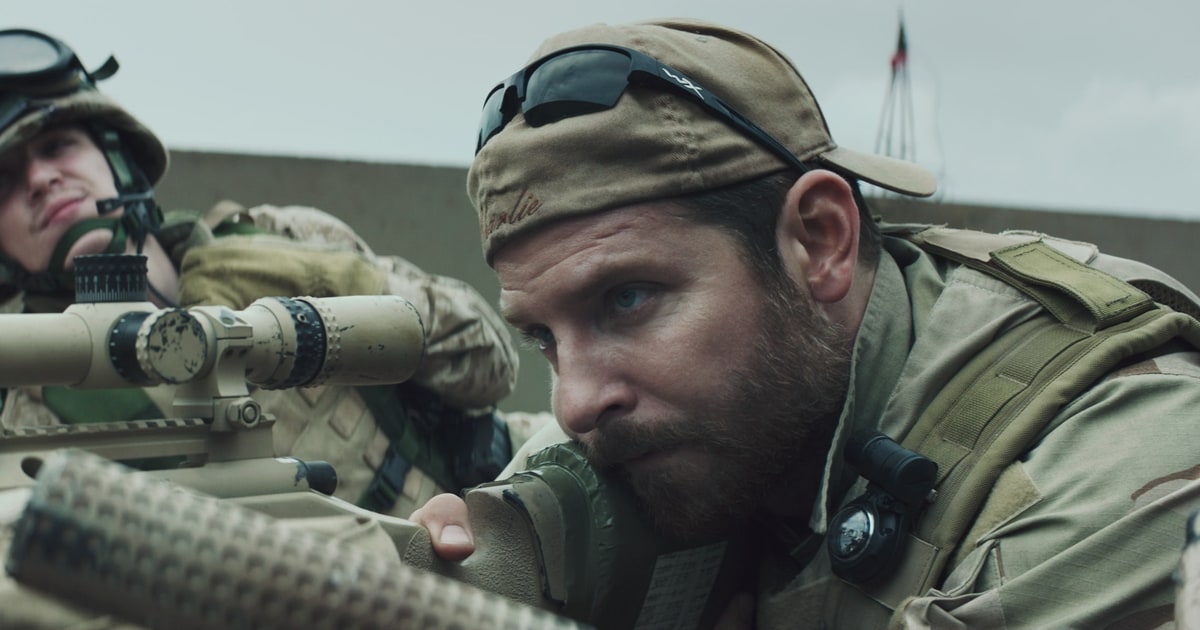
War is ugly, war is hell. It is has to be sold to the public in order to gain their support. Since the Vietnam War, the role of the media has increased significantly. The public opinion fell deeply as uncensored images and stories reached American households, the effects of which can be seen to this day. The patriotic message had to be molded in order to win back the hearts and minds of the people.
Cinema puts us in a dreamlike state where our emotions take over and we are persuaded to participate in the hero’s journey. We can be lured into believing there is a clear right and wrong, good and evil, when in reality the lines are blurry and gray. Regarding war, history is the judge of such matters, but the memory of people is short and malleable. The commercial industry sells products, so can war be sold. The interesting thing is that the tools and methods have far more in common than one may expect.
The relationship of the Pentagon in sharing the equipment and knowledge in trade for script rewrites with Hollywood is well known, but some filmmakers need few of these ‘artistic’ adjustments to put a shine on that military boot. Some of these films were made by people so deeply embedded with their own patriotism and admiration of the military that they just might be a little too blatant in trying to trick you into believing that war is a glorious thing.
10. Black Hawk Down
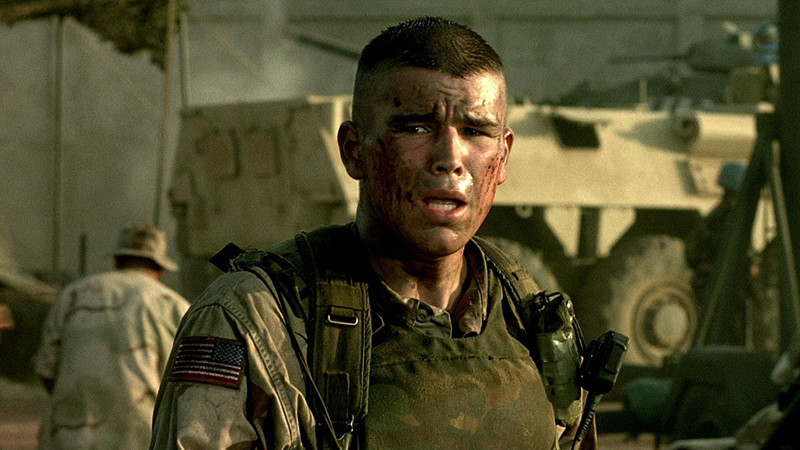
Ridley Scott is a one of the greatest directors to have ever graced our theater screens with his films, as a director who’s capable of philosophical questioning on a profound level. But when it comes to his portrayal of the military in this film, we have to take a few things into account:
a. He is working with producer Jerry Bruckheimer, who has produced two other entries on this list (“Top Gun”, “Pearl Harbor”)
b. His father was an officer in the Royal Engineers (British Army). Scott himself considered joining the Royal Army but his father pushed him to follow more artistic pursuits.
c. The military was involved with this movie to the level of script adjustments.
“Black Hawk Down” is a gut-wrenching, adrenaline-pumping action film that gives a sense of realism to the action. The soldiers experience casualties by the dozens and blood flows richly on both sides of the conflict. Here we see no supernatural human beings, but rather fragile men who make mistakes and wrong turns all the time.
We see some similarities between this film and “We Were Soldiers” in the way the enemy is displayed. They are at times mindless brutes driven by blind rage and out for blood, they are high in numbers and possess a crowd mentality. This gets juxtaposed with the organized team work of the Army Rangers. It is repeated several times that “No one gets left behind.” The main glorification here is not battle itself, which is portrayed for all its brutality, but the moral code of the Rangers. They are a unity and share a brotherhood. They are heroes for helping each other at the risk of their own lives.
Eric Bana’s character Hoot explains toward the end how he won’t say a word when he gets asked the question: Why do you do it? He says it’s because the people at home won’t understand that it’s about the men next to you, and that’s all it is. At one point, Josh Hartnett’s character Eversmann gets ridiculed and called an idealist by his fellow soldiers for actually believing in the cause behind their mission in Somalia.
It is shown as a virtue to be apolitical as a soldier because caring for your fellow soldier transcends everything else. “Once the first bullet goes past your head, politics and all that shit… just goes right out the window,” as Hood says, is a good quotable line, but when you don´t know why you’re there with bullets in the first place, something more vital than brotherhood has been lost.
9. Top Gun
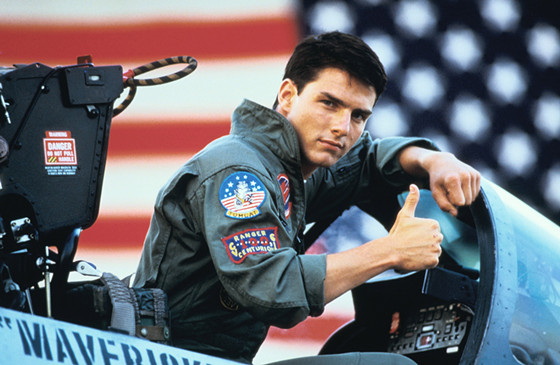
This is the movie that really made the Pentagon aware of the potential Hollywood has as a recruitment tool. It’s directed by Tony Scott, the brother of Ridley Scott whom shared a father that had a military background. The usual suspect Jerry Bruckheimer joins the party as producer once again.
The film is a our typical blender mix of teenage hormones: a hot blond woman, an oily shirtless volleyball scene, rock music, brotherhood, motorcycles, lightning-speed airplanes and explosions. It makes for good popcorn entertainment but it also gives us a skewed view of reality. Cowboy hero antics are what save the day in the end instead of our regular cold-blooded “march in line” soldier morale (represented in the character of Iceman).
Daredevil Maverick breaks the military rules on a regular basis but he gets away with it because he is such a good pilot. It promotes the idea that the individual ego is not suppressed in the military. When you are as good as Maverick, you get to correct (and sleep with) your instructors, brush off the anxious jealousy of your fellow classmates, and see the flare in the hot blond woman’s eyes.
In other words: the popular sporty high school guy with the brains and the brawn. When you are this cool (by 80’s definition), you get to transcend your community’s rules and break them. It’s very innocent fun on the surface, but it’s hard to deny that this doesn’t try to shoot a missile right into the center of our teenage hearts.
8. Behind Enemy Lines
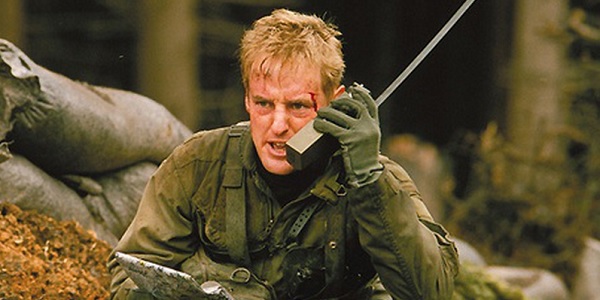
The release date of this film was hastened due to the 9/11 attacks, as the Pentagon needed the public to believe in war quickly again. Also, the film was in production before the events, and it fit their jingoistic agenda perfectly. It gives moral justification for breaking international diplomacy, because the Americans leave no man behind, and carries a heavy dosage of heroism. The Serbs are portrayed as pure psychopaths and fit nicely into the terrorist category.
Director John Moore came fresh out of the commercial business when he made “Behind Enemy Lines”, and it shows. This film is filled with such an incredible amount of visceral commercial techniques that it makes your eyes melt. Everything from hyper-fast cutting, freeze frames, cut-ins, wipe pans, shaky cameras, loud sound effects to black-and-white flashbacks is used here.
The story centers around F-18 fighter pilot Lieutenant Chris Burnett, who bears witness to a genocide being carried out during the Bosnian War. The F-18 is shot down and what follows is a cat-and-mouse chase between Burnett and General Miroslav Lokar, who tries to cover up his war crimes.
Burnett (played by Owen Wilson) is a doubtful Naval flight officer who is on the verge of turning in his wings because he does not see any real action and has lost the romantic vision he had of being in the military. After being shot down into a war zone, he gets more than he could have asked for.
An example of the realism of the action in the film: at the moment he’s being saved by helicopters while under fire from an entire army, he realizes the atrocity contained in evidence of the black box and he turns around, runs back into the line of fire in a slow motion sliding on the ice, gets the evidence, and continues to jump off a cliff to be caught by a soldier hanging from a wire on a helicopter.
This makes him the moral hero by fighting for the slaughtered victims and bringing war criminals to justice. When he’s finally saved and back on the helicopter, after seeing all the mass graves, his co-pilot shot point blank, and bullets and explosions around his head, he decides the military is a decent place to get his heroic adrenaline fix and he decides to keep his wings.
7. Red Dawn (1984)
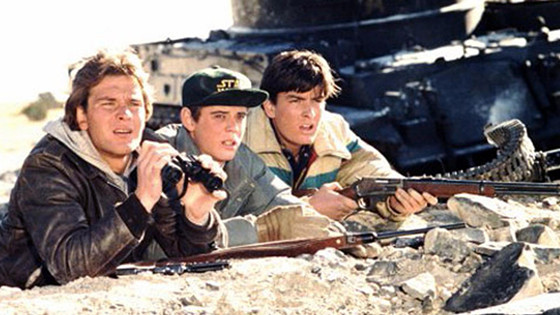
This film is what happens when you let a member of the National Rifle Association’s Board of Directors direct in a time of anxious Cold War paranoia. John Milius was famous for wanting to be paid upfront in the form of a $2,000 gun for his first draft of “Dirty Harry”. His love for the smoking barrel is unleashed within the first five minutes of screen time when the high school history teacher gets shot by the massive invasion of communist paratroopers from the sky.
What follows is an onslaught of the paratroopers firing their machine guns and rocket launchers at everything that moves, which happens to be high school children in this case. One group escapes into the woods and manages to form a guerrilla group named “The Wolverines”, who will harness their hate for the invaders to try and defeat them.
The film is filled with American patriotism, from a group of captured men singing “America the Beautiful” before they are executed, the screen filling Theodore Roosevelt quotes to hunting initiation rituals as in drinking deer’s blood, NRA slogans, etc. The communists are cartoonish in their portrayal with the big mustaches, funny accents and plain stupidity. As invaders, they put men in re-education camps, perform mass executions, and hang big posters with lines such as: “The new man arises from the ashes of capitalism.”
As the teenage guerrillas watch their parents die, their anger and hate (which keeps them warm) grows to great extent. This small group of kids continue to wipe out almost the entire communist army single-handed, and driven by their burning fury they kill commies until the red, white and blue waves graciously once again.
6. American Sniper
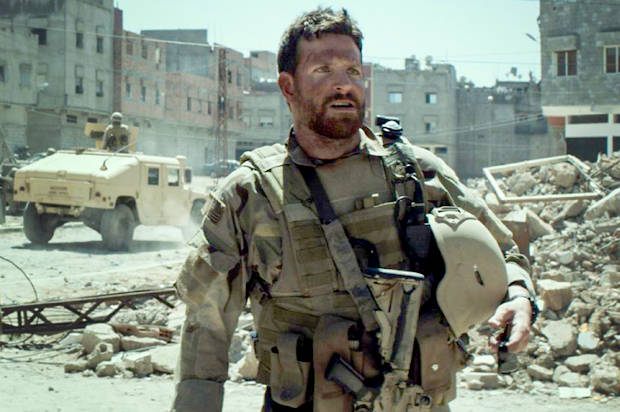
Based on real-life veteran Chris Kyle’s autobiography, from which it deviates on certain points to make it a morally just story, the movie takes the perspective of Chris Kyle “The Most Lethal Sniper in U.S. Military History” himself (played by Bradley Cooper) and tries to immerse us in his world that is both the Iraq war and plain old America itself.
The perspective starts of by showing us how there are great moral struggles and considerations going into the pulling of the sniper rifle trigger. Chris shoots a woman and a child who are both trying to throw a grenade at American soldiers. The scene is constructed in a way that makes us believe that he tries everything to avoid this from happening, but he is left with absolutely no choice because he has to protect his fellow soldiers. After shooting them both he feels devastated, but he tells his buddy he has never seen evil like this.
This is where some religious sentiments start to creep in. In a flashback we see a young Chris Kyle being told by his father how there are sheep, wolves and sheepdogs. Chris seems to be a sheepdog who is meant to protect the sheep from the wolves. The movie makes this extremely simplistic analogy and projects it over to the Iraq War. Chris is there to protect the Americans from the Iraqi wolves (or as they are called on multiple occasions, “savages”).
We are continuously shown occasions in which it is the Americans who are attacked first, therefore it is always self-defense when they shoot back. Antagonists like “The Butcher” are portrayed as such immensely evil psychopaths (he drills into a little boy to send out a message) that no moral debate is necessary to justify their demise.
Chris does let himself go into a revenge mission for his fallen comrade Biggles and his wounded brother, but when he fires the impossible shot to kill the enemy sniper (in glorious slow motion), his reason was because “he had eyes on our guys.”
After the war he claims he can answer to his creator for every single one of his 160 kills because he was just “protecting his guys”. In his eyes, he is actually saving lives by killing, and we are being sold on the idea it is a noble and patriotic act.